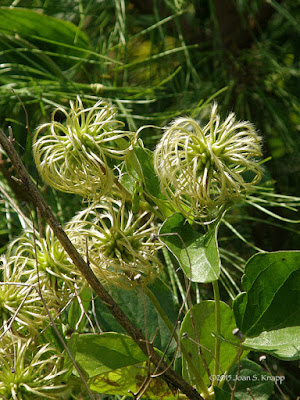June 26th. (Continued from…). Once again, it was time for a
road trip to monitor frogs. So, as usual, we used the trip to scout
wildflowers.
two
dozen Variegated Fritillaries (Euptoieta claudia)
ravenously feeding on Lanceleaf Coreopsis (Coreopsis lanceolata) flowers. These
were the only flowers in sight and the fritillaries were making the best of
them. They were moving so rapidly, I only managed this one shot.
The
Fishing Creek WMA isn’t the greatest place for wildflowers but we can count on
finding Clasping Milkweed (Asclepias amplexicaulis) in a couple of places.
These plants are easy to identify, even when they are not in bloom; their…
leaves
look leathery with undulating margins but the cardinal characteristic is how
they ‘clasp’ around the stem. Several plants had…
developing
seed follicles. This one was outstanding, with four follicles.
We
drove down to a point overlooking the Fishing Creek inlet to Clarks Hill Lake
on the Savannah River, where…
Buttonbushes
(Cephalanthus occidentalis) were blooming over the water.
A
small movement on the ground attracted my attention. It was a…
Small
toad – about ½ to ¾ inches long. It hopped ahead of me and stayed in the shade,
making photographing it challenging. It’s probably a Fowler’s Toad (Anaxyrus
[Bufo] fowleri). It’s not the first time we’ve seen baby toads in this same
spot.
We
headed back out of the WMA and turned right on Ohara Standard Road, where we
had found Narrowleaf Evening Primrose (Oenothera fructicosa) plants in bloom on
our previous trip.
This
time, some Butterfly Milkweed (Asclepias tuberosa) were still blooming. Being
almost the only ‘game in town,’ they had attracted a…
Gray
Hairstreak (Strymon melinus), and a…
Thread-waisted
Wasp (Ammophila sp.), neither of which was discouraged by my presence.
We
headed over to the Broad River WMA via Bolton Road where we were tantalized by
the sight of…
Clematis
sp. seeds. Based on the flowering seasons of Clematis sp., these probably were
one of the species with small, bell-shaped flowers. These may have been
blooming on our previous trip but we overlooked them because they would blend
into their background. We’re going to make a note to look for flowers earlier
in the year now that we know precisely where to look for them.
We
still had plenty of sunlight left. We can’t start the frog survey until dark
when the frogs start to call. So we decided to drive down GA-17 to Clarks Hill
WMA. This is a better spot for wildflowers. At the right time of year, we’ve
found Birdfoot Violets (Viola pedata), White Wild Indigo
(Baptisia alba), and Indian Pink (Spigella marilandica). The roadside is mowed
and the edge of this zone is often the best plat to find wildflowers.
At the end of one road, we found…
Pigeonwings (Clitoria mariana), and a…
Spiked Hoarypea (Tephrosia spicata).
At
the edge of the woods, we saw a…
tree
that had been thoroughly worked over by woodpeckers.
Right
at the edge of the mowed area, we spotted a lone…
Rosepink
(Sabatia angularis) plant in...
bloom.
It would have been easy to miss this in the late afternoon sun.
We
found one of the gates that is usually closed was open so we took the
opportunity to drive through and we made our final spotting of the day.
From
a distance, the plants did look like much, but there were a lot of them. When I
walked over to them, I could see the similarity of the…
flower
heads to the Hoary Mountainmint (Pycnanthemum incanum).
The
leaves, however, were quite narrow compared with the Hoary Mountainmint. A
little bit of research revealed that this was the Narrowleaf Mountainmint
(Pycnanthemum tenuifolium).
Close-up
views of the flowers.
Once
again, we had a successful trip meeting old friends, encountering some
mysteries, and making at least one new friend.
Related
posts:























No comments:
Post a Comment